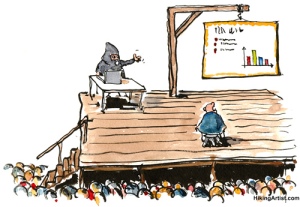 Have you ever noticed the unique corporate irony that can happen to high performers? That universal truth that tends to take people who get work done and give them more work.
Have you ever noticed the unique corporate irony that can happen to high performers? That universal truth that tends to take people who get work done and give them more work.
What the heck is that all about?
And before you say you would never do that in your team,
I suggest you remove your self-delusion layer that is so helpful for self-esteem, but may not be completely honest.
If you are a high performer the odds are this has happened to you, and if you are a leader you probably have done this to others.
Why?
When important stuff needs to get done you are likely to give it to people you trust. Who do you trust? The high performer. That person who has gotten stuff done for you in the past.
So, if we acknowledge that those who can do more, will be called upon to do more, we now need to figure out how do we make that fair. Not equal but supporting a general sense of integrity.
As a leader, you need to make sure that the opportunities you are giving your high performer are those that are supporting their general career goals — sometimes additional work, while painful, might come with visibility that is critical for getting to the next level.
As a high performer, you need to make sure you are working for someone that understands and respects your career aspirations and core values.
How do you know if that is the case?
You make sure you’ve had the discussion.
If you have not had a candid and honest discussion about what you hope to achieve with your career, and what you expect to contribute, than odds are you will continue to do more work than others while wondering why this keeps happening to you.
The key is that you hit the right balance for you. That you are achieving the results that matter to you on purpose, not just letting things happen to you.
Having found myself on every single side of this equation, I have to say that this is something you need to think about before you find yourself the workhorse of the organization. If you get it wrong, you could find yourself in the emergency room wondering why half of your face is numb (completely random and not-at-all autobiographical example, that turned out to be a migraine, I mean if that had happened).
If you get it right, you can find yourself able to accomplish more than you might have imagined possible, while getting great visibility and recognition for your flexibility, capability and unique skills.
In the end, the choice really is yours.
 As you can imagine, in my job I ponder innovation a lot. Innovation is so critical to success in technology and frankly it’s the fun part of what we do.
As you can imagine, in my job I ponder innovation a lot. Innovation is so critical to success in technology and frankly it’s the fun part of what we do.

